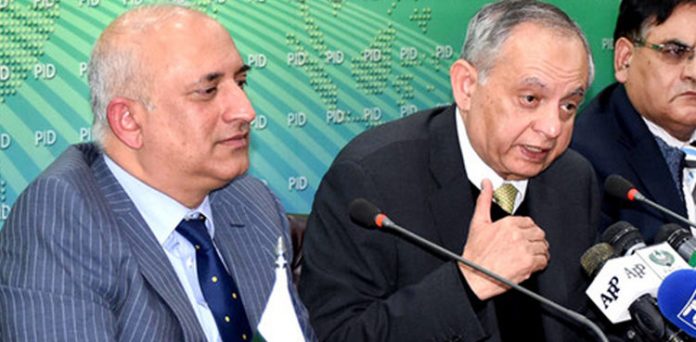- ‘Integration of SECP with Punjab and Sindh business registration portals has reduced the time and process for company registration’
- ‘Complete automation of property registration in Punjab has significantly improved transparency and quality of land administration’
ISLAMABAD: As a World Bank team is coming to Pakistan on April 15 to assess the country’s business environment, the government has claimed that it has reduced the number of taxes from 47 to 10 in order to promote ease of doing business in the country.
Advisor to Prime Minister on Commerce Abdul Razak Dawood and Board of Investment Chairman Haroon Sharif claimed on Wednesday that a number of steps were taken so far to improve Pakistan’s ranking in WB’s Index of Ease of Doing Business (EoDB).
Addressing a press conference, Dawood claimed that the number of taxes was reduced to 10 through the introduction of an online payment system for federal and provincial taxes, contributions and duties.
Against the claims of sources that little efforts were made this year to improve Pakistan’s ranking from the existing 136th position, the BOI expects significant improvements this year.
The country had improved its ranking by 11 points and had moved from 147th to 136th position in WB’s Doing Business Report 2019. Since the launch of EoDB report in 2002, it was the first time that Pakistan had jumped 11 points in one year.
According to the BOI, the federal government has introduced a number of reforms to facilitate the investors and to improve EODB in the country.
“The integration of the Securities and Exchange Commission of Pakistan (SECP) with Punjab and Sindh business registration portals has reduced the time and process required for the registration of a company and has provided one platform where business-related problems are addressed,” the BOI chief said. “The company can now be registered in one day with the SECP on its online platform.”
He highlighted that the Lahore Development Authority had started its one-window operation where all departments involved in the process of issuing a construction permit were present, adding that the Sindh government would launch a similar facility in Karachi, work for which has already begun.
“After the introduction of the above-mentioned one-window facility, the process time has been reduced from eight months to two months in Lahore and will be reduced to three months in Karachi,” he stated. “Besides, complete automation of property registration in Punjab through online channels has reduced the time drastically and is one of the key areas of reforms. It improves transparency and quality of land administration.”
In order to help importers/exporters and to reduce the time and cost of compliance with departments, key departments have been integrated in the Web-Based One Customs Platform (WeBOC), Haroon Sharif said, adding that K-Electric has made the process of getting a commercial electricity connection easier by making it online where the customer could track the application as well.
He said work on the establishment of a collateral registry for unincorporated entities has also been started and would become operational with the appointment of the registrar.
“This will help the small businesses to use their moveable assets as collateral in seeking credit,” he added.
Sharif said dedicated EoDB offices have been set up at federal and provincial levels for the purpose of removing bottlenecks and facilitating investors in their smooth business operations.
He said it was a priority of the government to facilitate new business entrants by making the processes easier, faster and cheaper, adding that the next step was to cut out the redundant regulations and remove unnecessary permissions/NOCs and inspections.
According to sources, the WB team visits its member countries in April to assess the doing business environment. The bank compiles its final report by November and releases the index with detailed findings.




